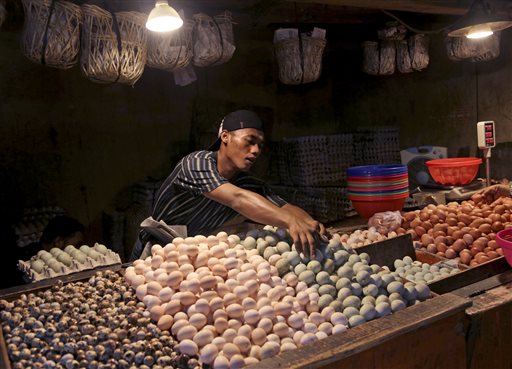Indonesian growth slows in 1st quarter

A vendor arranges eggs as he waits for customers at his stall at a market in Jakarta, Indonesia, on April 29, 2014. Indonesian growth slowed more than expected in the first quarter, official data showed Monday, May 5, as weak exports and tight monetary policy weighed on Southeast Asia’s top economy. AP PHOTO/TATAN SYUFLANA
JAKARTA—Indonesian growth slowed more than expected in the first quarter, official data showed Monday, as weak exports and tight monetary policy weighed on Southeast Asia’s top economy.
Growth in the archipelago nation has been easing over the past year as Chinese demand for key commodities slows, foreign investors are put off by policies perceived as nationalistic and interest rate hikes curb lending.
Year-on-year growth slipped to 5.21 percent in the three months to the end of March, down from 5.72 percent on-year expansion in the fourth quarter of 2013, the official statistics agency said.
Economists had forecast growth of 5.60 percent.
Growth for 2013 came in below six percent for the first time in four years and analysts said the latest lacklustre data indicated a pick-up was unlikely.
Article continues after this advertisement“We think that tight monetary policy, along with weak demand for commodity exports, will prevent a bounce-back to the six percent-plus growth rates that not long ago looked like the norm,” said Capital Economics in a note.
Article continues after this advertisementIndonesia hiked interest rates by 175 basis points last year to 7.50 percent after stocks and the rupiah plunged as speculation grew that the United States was about to start winding back its stimulus program.
The move was credited with shoring up the economy, which has been more stable in recent months, but it appears to have hit growth, analysts said.
Foreign investment growth—while still at high rates globally—also slowed by more than half to around 10 percent in the first quarter of this year, according to data released last month.
Overseas businesses have been put off due to policies perceived as nationalistic such as a ban on the export of some unprocessed minerals, analysts said.
Exports fell 0.78 percent in the first quarter, while imports fell 0.66 percent, according to the statistics agency.
But household consumption—a key driver of the economy—remained robust, growing at 5.61 percent as politicians spent on social projects ahead of elections last month, the agency said.